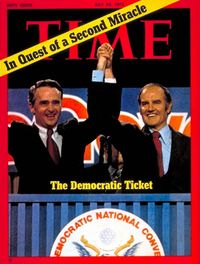
They're both fans of the Great Game.
The Great Game is a way of analyzing everything through the Great Men leading Great Movements and Great Peoples on to Greatness. It's a top-down analysis that sees peoples and movements as mere pieces on a chessboard, to be manipulated by the Great Man (it's almost never women) at the Top.
If you've ever watched nerds debate Austrian history, for instance, or play video games, you've seen this type of analysis in action. Princes and kings and heroes and villains. Everything is seen from 30,000 feet, and everything can be manipulated because the Great Man has control of the board.
Open source explicitly rejects this type of analysis. Because the code is open for inspection, available to all, it's the code that matters, not the Great Man (or woman) behind it.

When Ellison released Open Office to Apache, it was based on the assumption that the software would become subject to a Great Game, a struggle between LibreOffice and Apache for dominance, based on politics, press releases and money.
Lots of people are very happy to play along with this analysis, especially when it comes from someone from, say, Microsoft.
But the objections Keith Curtis makes here are not Great Game objections. He is concerned that this is just a fork of the community. He notes that IBM is not committing development resources to the code base, and that it's the code that counts. LibreOffice has the code, and it's under the GPL.
The Free Software Foundation also prefers LibreOffice to OpenOffice. This is supposed to be news. It's not.

The background of Curtis' missive is the process Apache must have to approve or not approve the entry of OpenOffice into the Apache incubator. Curtis is suggesting a “no” vote. My own decision, and I think the decisions of Apache leaders, will be based on whether there are developers willing to take on the task of managing the code base and moving it forward.
If there are, they deserve support, because OpenOffice is more likely to break through to large user sets than LibreOffice, and the success of the code should be based on its market share, not politics. If there are not developers willing to move forward with the code, on the other hand, it should not go forward, because Apache is no place for dead projects.
Forking OpenOffice is not the issue. There are already forks. The question is whether developers can be recruited to run the code base. at Apache, enough, and of high enough quality, that the code base can progress and succeed.
Who will champion this code? Who will mentor it? Do those people have credibility within the Apache community – can their words be trusted to turn into action?
Those are the key questions here. They should be answered by those who put out the initial invitation. The Great Game counts for nothing. It's the code that matters.











“…OpenOffice is more likely to break through to large user sets than LibreOffice…”
What is your justification for the truth of this statement?
“…OpenOffice is more likely to break through to large user sets than LibreOffice…”
What is your justification for the truth of this statement?
It’s pretty obvious. OpenOffice has marketing momentum behind it. OpenOffice is now under the Apache license, which many companies prefer to copyleft. OpenOffice also has the market share right now.
More likely doesn’t mean certain, though.
It’s pretty obvious. OpenOffice has marketing momentum behind it. OpenOffice is now under the Apache license, which many companies prefer to copyleft. OpenOffice also has the market share right now.
More likely doesn’t mean certain, though.